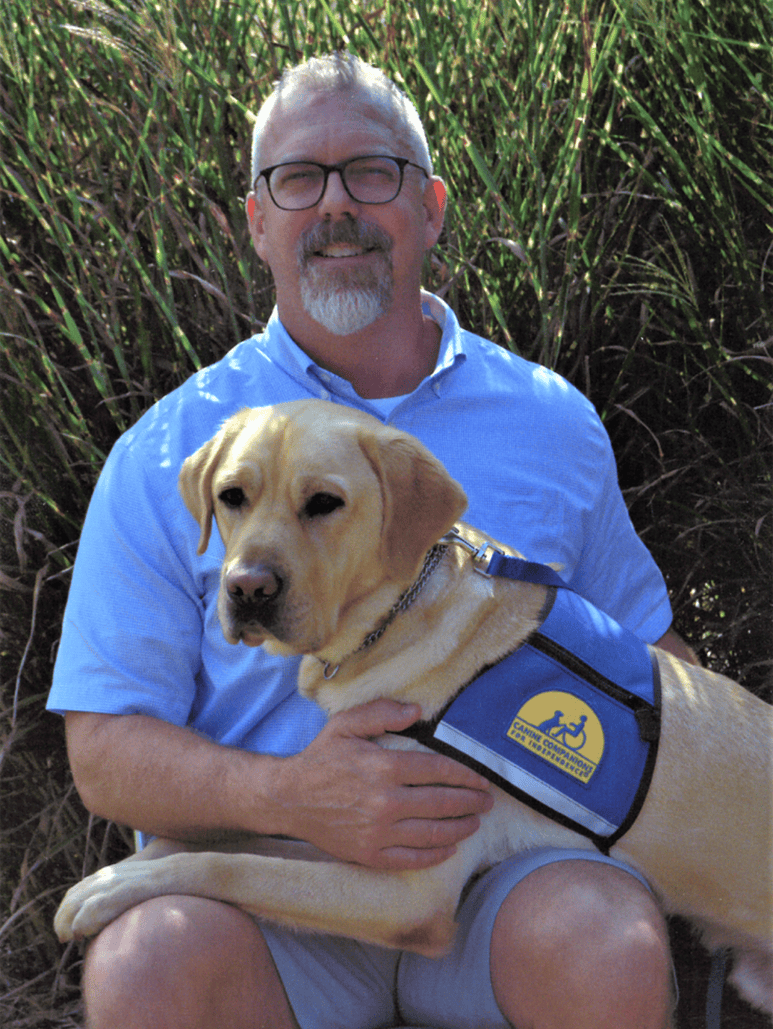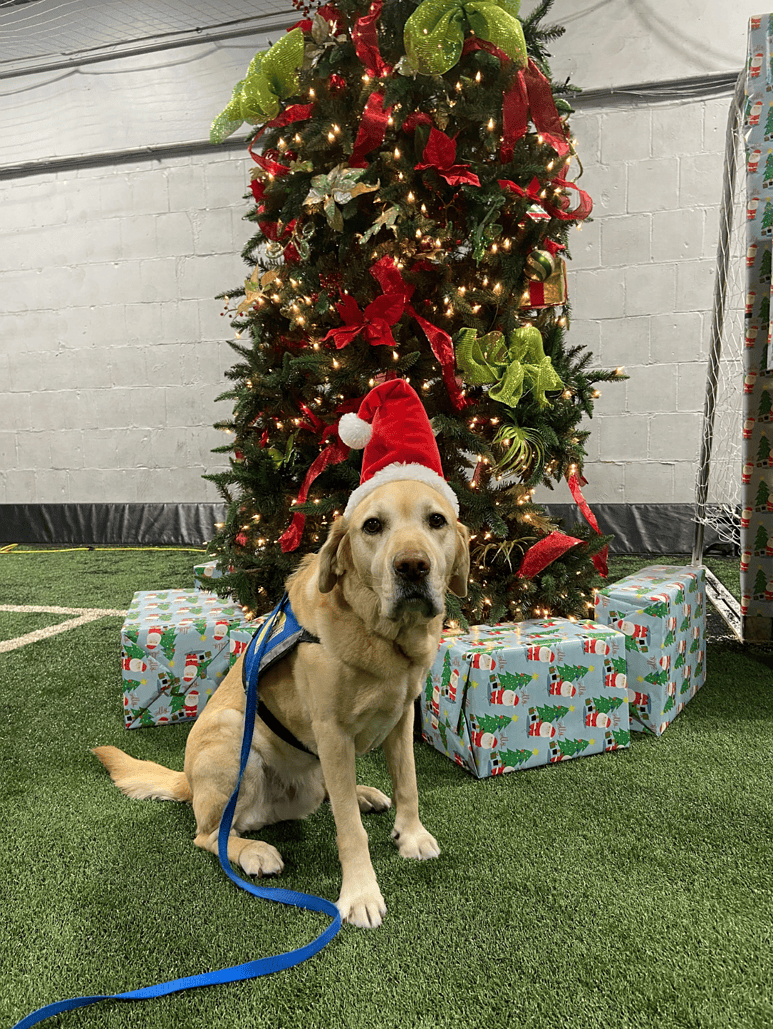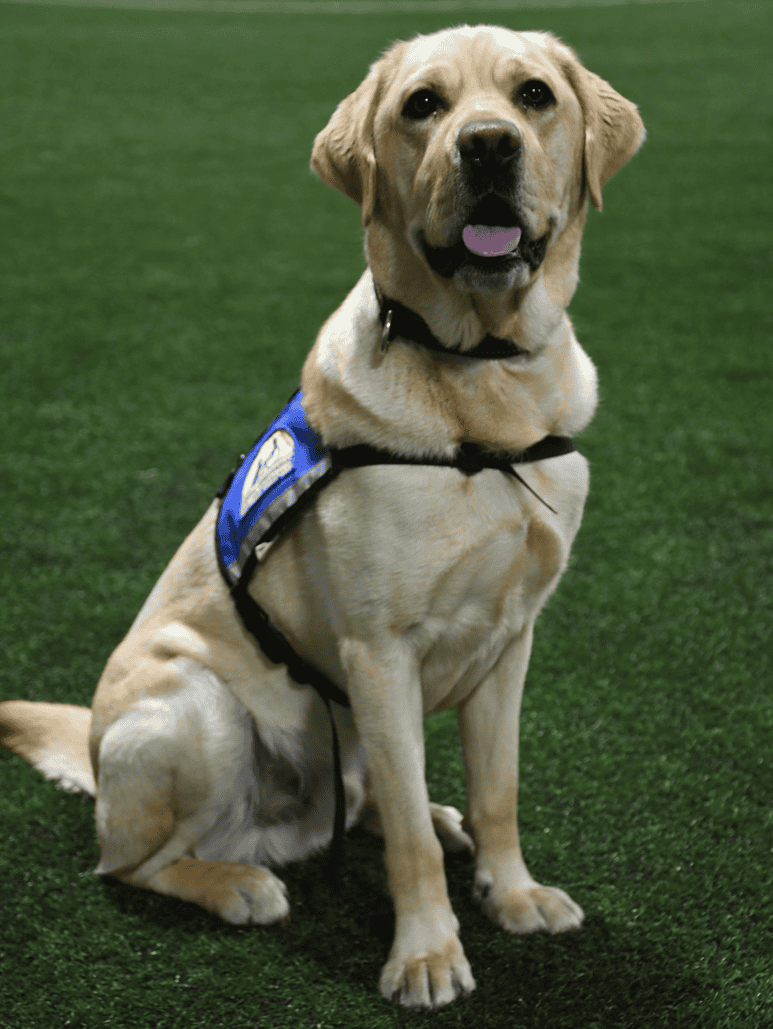Pongo Helps Mercy Home Kids Cope with the Pandemic
As we all marked almost two years of the pandemic, so too did the kids of Mercy Home for Boys...
January 13, 2022
September 9, 2024
When Tom Gilardi, then Mercy Home’s vice president of youth programs, observed a young person’s mood improve after playing with a coworker’s dog for a short time, it made him think more seriously about animal assisted therapy. “Here we had concrete evidence of the positive effects that dogs have on our kids,” Tom said. Emily Neal, then the Home’s clinical director, suggested that Mercy Home get its own full-time therapy dog.

Soon, Gilardi was on his way to New Albany, OH just outside of Columbus, where he spent several days at a training campus of Canine Companions for Independence (CCI), a national nonprofit organization that has bred, raised, and expertly trained assistance dogs since 1975. Their dogs are trained in over 40 commands designed to assist people with disabilities or to motivate and inspire clients with special needs. The dog was matched with the Home free of charge thanks to the support that donors provide to CCI.
Gilardi was in a class of seven or eight other people from around the Midwest who were approved to be matched with facility dogs. He said that when they brought all the dogs out, one stood out among the pack.
“I immediately locked eyes with Pongo,” Gilardi said. “And I was like, ‘I want that dog.’”
Gilardi ultimately learned that even before that meeting, CCI had assigned Pongo to Mercy Home. “This was destiny,” he thought at the time. “This was meant to be.”
Seven years later, we look back on the life and legacy of Mercy Home’s first canine coworker, and celebrate the joy, acceptance, and unconditional love he brought to everyone he encountered.
Named after the patriarch pup from the 1961 animated Disney classic 101 Dalmatians, Pongo was born in California and officially joined our team in early 2018. In a few words, Pongo’s job description was to comfort, motivate, and inspire our young people by fostering an atmosphere of calm and acceptance. His qualifications for the role stemmed from both temperament and training.

“He just was so friendly, so mellow,” Gilardi said. He recalled Pongo’s countless interventions over the years. “Whether he was laying with kids in the milieu, or fetching the ball, or lying next to a kid while he’s reading and doing his homework, to kids who were really upset and they needed an opportunity to kind of calm down.”
And our young people have been vocal about what Pongo has meant to them, from their earliest observations in 2018 to the condolence cards and notes they’ve sent to Gilardi this week since Pongo’s passing.
“Whenever I see him, he makes me feel better than I’m feeling,” said a young person who was among those interviewed during Pongo’s earliest days with us. “If I’m really down or feeling depressed, when I see Pongo wagging his tail, it means he’s happy, so I feel happy.”
Animal-Assisted Interventions (AAI’s) have been a widely accepted component in mental health and therapy, with more recent peer-reviewed research indicating positive outcomes for individuals who have experienced trauma. Dogs are the species most often employed in AAI’s for trauma in which specially trained animals promote feelings of calm and comfort in individuals suffering from trauma-induced anxiety. Dogs used in therapeutic settings reduce feelings of loneliness and stress responses that children and adults can develop from living in threatening conditions. Interacting with animals has also been shown to facilitate social interactions, encourage mindfulness, and stimulate overall positive emotions.
“Mercy Home has always worked to incorporate new ways to foster a calm and healing environment for our young people,” said Fr. Scott. “Pongo was an instrumental part of the care we provide.”
Pongo’s effectiveness in helping young people cope with stress was vividly demonstrated during the challenging events of 2020 and 2021. Every day, Pongo was there to reassure our young people and help take their minds off of the hardships of lockdowns and remote learning. One young person at the time said, “When he’s here, Pongo makes me relax and makes me forget that there’s a pandemic going on.” And his calming and dependable presence helped many youth focus as they did homework or logged on to virtual classrooms.
Back then, Gilardi observed that the pandemic was helping us remember the importance the simple things in life. “Slowing down has really emphasized the importance of great food, a good night’s sleep, relaxation, and reflection. And Pongo has been a real part of this simplicity. Finding joy is now more important than ever, and Pongo continues to bring joy and unconditional love to our kids.”
But aside from his many clinical contributions, Pongo also had an important impact on our living environment, according to Gilardi—he made it feel more like a real home for our kids. “It really did feel like a home here, but having a dog was just really special for Mercy,” Gilardi said, noting that he helped normalize the experience for our kids. Just like our holiday celebrations are meant to recreate that familial atmosphere, Pongo would often accompany Gilardi, Fr. Scott, Santa Claus, and our roving band of merry elves as they paraded from one program to another at Christmastime, handing out presents to our young people.

And his impact wasn’t limited to our young people. Many coworkers continue to pay tribute and recall how Pongo brightened their days. “I had a coworker here that started, I don’t know, six, eight months ago and said they had met Pongo and he was one of the reasons that they felt really happy to be here and felt welcomed here,” Gilardi said.
And because Pongo lived with Gilardi, he also became a beloved member of the Gilardi family. “His loss is difficult for all of us,” Fr. Scott said, “but especially for the Gilardi family.”

“I think he was part of the fabric of Mercy Home,” Gilardi said. “He touched so many lives—the children who lived here, the family members of children who lived here, coworkers, and even donors who are big dog people who love the fact that we had Pongo here at Mercy helping the kids.”
As we all marked almost two years of the pandemic, so too did the kids of Mercy Home for Boys...
January 13, 2022
Mercy Home's facility dog Pongo is more than a pet who, along with all dogs great and small, will be...
September 13, 2021
It takes a village to care for Mercy Home's facility dog, Pongo, and ensure he provides paw-sitive care and comfort...
August 24, 2021
Comments